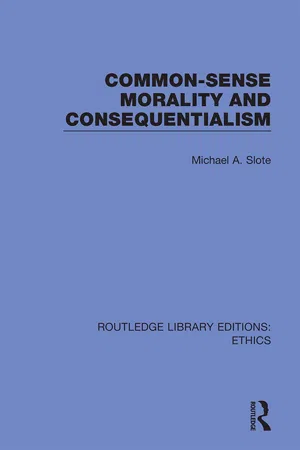1 Any moral theory that makes right and wrong action depend entirely on results or consequences is act-consequentialist. A theory holding that an act is right if and only if it produces the best state(s) of affairs may go on to claim that certain considerations of justice are relevant to the goodness of overall states of affairs. Such a theory will be act-consequentialist but not act-utilitarian. Cf. Amartya Sen, ‘Utilitarianism and Welfarism’, Journal of Philosophy, 76, 1979, pp. 463–89; and Samuel Scheffler, The Rejection of Consequentialism, Oxford University Press, 1982, ch. 2 and pp. 72ff.
2 I shall not be discussing those cases where desire for the optimal course of events may lead one to qualify act-consequentialism into some form of act-and-motive consequentialism. (Cf. R. M. Adams, ‘Motive Utilitarianism’, Journal of Philosophy, 73, 1976, pp. 467–81.) Because other forms of consequentialism are not immediately relevant to the main conclusions of the present chapter, I shall for the moment drop the word ‘act’ in speaking of act-utilitarianism and act-consequentialism. Note too that the connection between benevolence and optimality assumed in the main text will be called into question in Chapter III, below.
3 See Williams’s ‘A Critique of Utilitarianism’ in Smart and Williams, Utilitarianism: For and Against, Cambridge, 1973; T. Nagel’s ‘The Limits of Objectivity’, in S. McMurrin, ed., The Tanner Lectures on Human Value, I, Cambridge University Press, 1980, pp. 119ff.; and S. Scheffler, op. cit., passim. Nagel also discusses some of the reasons why the impersonal standpoint itself is so appealing in ethics and elsewhere.
4 See W. D. Ross, The Foundations of Ethics, Oxford University Press, 1939, pp. 72ff., 272ff. Cf. Sidgwick, The Methods of Ethics, London, Macmillan, 1962, 7th edn., pp. 431f.
5 One can imagine either that one kills oneself, knowing that the organs will be thus used, or that with superior technology and equipment one actually brings about the requisite operation on oneself.
6 E.g., by Robert Nozick in Anarchy, State, and Utopia, New York, Basic Books, 1974, p. 30; by Thomas Nagel, op. cit. ; and by S. Scheffler, op. cit., esp. ch. 4 and p. 121. I am especially indebted to Scheffler’s formulation of these particular problems.
7 Interestingly, Scheffler never remarks on the self-other asymmetry of ordinary deontological restrictions and in fact always formulates those restrictions in symmetric form. He says, e.g., that they are restrictions against ‘harming some undeserving person’. I have found only one place where the asymmetry slips in unnoticed (p. 100).
8 In deprecating oneself, one may ‘do oneself an injustice’, but this is presumably .not the morally relevant sense of the notion.
9 On the other hand, a kind of moral-theoretic methodological conservatism may indicate that we not abandon common-sense morality until we are given strong reasons to do so.
10 The distinction, roughly, is between an asymmetry concerning omissions and one concerning commissions. But Nagel (op. cit.) has argued that deontological restrictions concern even what one intentionally allows. According to Nagel, roughly, one may not deliberately allow someone to die as a means to prevent other deaths (or to prevent other people intentionally allowing people to die). I have stated the asymmetry regarding the allocation of harms and benefits so that it lies outside even this broad, intentional-omission-including notion of deontological constraints, by speaking of the difference between ignoring benefits (harms) to oneself and to others – where such ignoring may not involve intentionally or deliberately failing to prevent harms or benefits, but simply not bothering about them. The self-other asymmetry is thus not entirely limited to the usual area of side-constraints or deontological restrictions.
11 However, consider the qualification mentioned in note 2, above.
12 On this point see, e.g., Sidgwick, op. cit., p. 246.
13 See, e.g. Nozick, op. cit., p. 30n. ; for some problems about defining the morally relevant sense of ‘innocent’, also see Nozick, op. cit.
14 See J. Thomson, ‘Killing, Letting Die, and the Trolley Problem’, The Monist, 59, 1976, pp. 204–17.
15 Arguments of both these sorts can be found in Jonathan Bennett’s ‘Morality and Consequences’, in S. McMurrin, ed., The Tanner Lectures on Human Values, II, Cambridge University Press, 1981, pp. 45–116.
16 See his ‘Doing Good: the Right and the Wrong Way’, Journal of Philosophy, 79, 1982, pp. 439–55.
17 See Scheffler, op. cit.
18 See Bernard Williams, op. cit., section 5.
19 See Scheffler, op. cit.
20 Don’t say: ‘but the consent in the first case is of another person and one should not take another person’s consent as seriously (as literally) as one takes one’s own.’ That is just our asymmetry in another guise. Also, I have ruled out of consideration any religious injunctions against suicide that might make the cases seem more similar. Perhaps, I should say that the asymmetry I am speaking of is one of common-sense secular morality.
21 In The Object of Morality, London, Methuen, 1976, p. 26.
22 By the same token, sociobiological explanations of ordinary morality that focus on the evolutionary effects of altruism seem also to be incapable of motivating or accounting for the self-other asymmetry. If the gene-survival value of altruism explains the existence of moral imperatives concerning others, why shouldn’t the survival value of self- concern have generated similar imperatives concerning one’s behaviour towards oneself?




